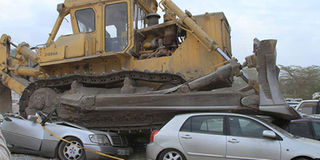Car smuggling ring eludes KRA dragnet

Vehicles imported fraudulently are destroyed at the East African Portland Cement on August 31, 2018. PHOTO | FILE | NATION MEDIA GROUP
What you need to know:
- In 2016, the taxman had indicated that there could have been more than 300 other vehicles on Kenyan streets with questionable registration.
- KRA has since recovered some Sh36 million from the car syndicate with 15 cases prosecuted involving 18 individuals.
- The KRA and NTSA systems are however supposed to work in tandem, such that one cannot get a number plate before being cleared thorough customs, which essentially means payment of duty.
Exactly two years since the Kenya Revenue Authority deregistered some 121 vehicles suspected to have been imported without payment of duty, only 18 have been traced, underlining the intricate nature of the smuggling syndicate behind the illicit trade.
Since 12 vehicles had already been presented to the KRA for inspection after the first notice was issued, it means only six have been netted in 24 months.
The taxman told Sunday Nation that another set of 74 cars not listed in the 2016 notice have been found to have been fraudulently imported since then as the tax evaders go into overdrive to beat KRA systems in the illicit trade.
KRA Commissioner for Investigations and Enforcement David Yego said police have been properly briefed to hunt for the vehicles whose registration details were made public in June 2016 and de-registered three months later.
“Apart from those in the list of 121 motor vehicles that are still at large, the authority suspects there are more vehicles still out there in the public, which we cannot quantify at this moment in time for suspected tax evasion. It is worth noting that investigations generally are complex and bound to take considerable time,” Mr Yego said.
MISSED REVENUE
In 2016, the taxman had indicated that there could have been more than 300 other vehicles on Kenyan streets with questionable registration. The 74 additional cars impounded could have been part of the vehicles.
A multiagency team involving KRA, the National Transport and Safety Authority, the Directorate of Criminal Investigations and the National Police Service, among others, is burning the midnight oil to battle the cartel, which keeps changing tactics in ensuring high end cars are imported without duty and fraudulently registered in the country.
KRA has since recovered some Sh36 million from the car syndicate with 15 cases prosecuted involving 18 individuals.
A key method employed by the cartel is to import the cars and declare them as being on transit to either Uganda or Rwanda and then, after evading duty, the vehicles are dumped in private yards from where they are registered.
NUMBER PLATE
Since vehicles entering the Kenyan market are not allowed to leave the ports without registration numbers, the use of transit is a loophole.
The KRA and NTSA systems are however supposed to work in tandem, such that one cannot get a number plate before being cleared thorough customs, which essentially means payment of duty.
A seamless flow of information from the KRA’s Simbasystem and NTSA’s Integrated Transport Management System was meant to eliminate human intervention, which was blamed for the manipulation of the motor vehicle database to give the cartels a window to register the untaxed vehicles.
Mr Yego said the use of tracking to monitor such cargo that is at risk of dumping into the Kenyan market has helped lower the illicit trade.
“The launch and implementation of the Regional Electronic Cargo Tracking System (RECTS) by KRA in March 2017 has greatly helped in tracking of transit motor vehicles to their final destination, hence reduced incidences of dumping into the local market.”
Sources familiar with the tracking operations, however, spoke in confidence to Sunday Nation that there have not been sufficient seals to track all the cargo on transit, hence occasionally making the monitoring hard. Priority is always given to other sensitive products like medicine.
VEHICLES DEREGISTERED
Among the 121 cars deregistered in 2016 were high end Sport Utility Vehicles, including Cabinet Secretary Eugene Wamalwa’s Range Rover, which had been registered as an Isuzu truck. The vehicles are said to have evaded over Sh500 million in tax.
“Pursuant to the Public Notice published on 10 June 2016, the Authority hereby invokes Section 6 (10) and Section 6 (11) of the Traffic Act, Cap. 403 Laws of Kenya and withdraws the registration numbers with effect from the date of this notice.
“The Authority has reasonable ground to believe the motor vehicle registration numbers have been obtained in error, fraudulently or in a manner contrary to the provisions of the Traffic Act,” the September 15 joint notice with NTSA read.
The smuggling syndicate also work hard to ship in vehicles into the country that are older that eight years (the legal limit). Kenya is a major transit point for vehicles destined for Uganda and Rwanda, both who have no age limit for vehicles.
They also use stolen identity to register the vehicles, meaning one can easily find themselves fixed in a car ownership — for a smuggled vehicle, mostly stolen abroad — without ever owning one.




